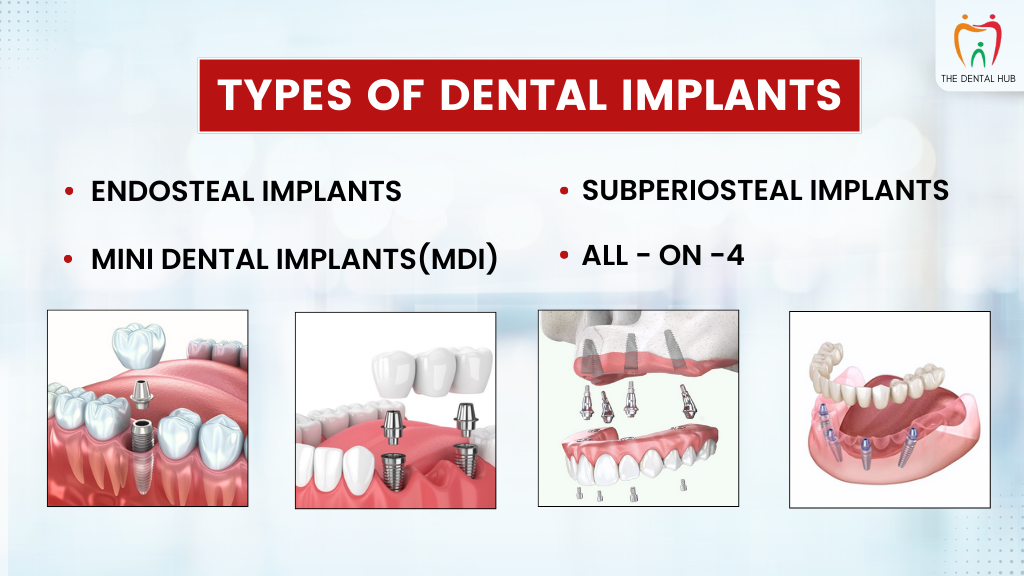Loss of teeth not just impacts one’s smile but also one’s confidence, oral health, and general health. Dental implants have evolved to become one of the most reliable and durable tooth replacement options over the years. Not just do they restore function but also aesthetics, giving patients a natural smile that is close to their own. We offer specialized dental implant procedures at The Dental Hub in Gurgaon, which are tailored to address the individual needs of every patient.
But did you know that dental implants come in a number of different forms these days? Each is formulated to address certain problems, bone issues, and treatment objectives. If you are planning to have implants, knowing the options will make your decision more informed.
What is a Dental Implant?
Dental implants are artificial substitutes for tooth roots, commonly made up of titanium, that are implanted into the jawbone surgically. Through the bone integration of the implant by a process called osseointegration, it gives a firm anchorage to artificial teeth like crowns, bridges, or dentures. In contrast to removable dentures, dental implants are stable and permanent and are meant to last for decades with good maintenance.

Types of Dental Implants
1. Endosteal Implants
Endosteal implants are the most common type used throughout the world. They screw directly into the jawbone itself and serve as an artificial root to support a replacement tooth or bridge. They are typically screw-shaped, but can be cylindrical or blade-shaped.
Most suitable for:
- Patients who have dense jawbones that can adequately support the implant.
- People looking for a long-lasting, long-term, and realistic substitute
Advantages:
- High success rate
- Feels and functions as natural teeth
- Permanent solution if properly maintained
2. Subperiosteal Implants
For patients who have inadequate healthy jawbone and are not good candidates for bone grafting, subperiosteal implants are an option. Instead of being placed within the jawbone, these implants are placed on the surface of the bone, but under the gum. A metal framework is used to support the implant, and the gums are allowed to heal over the implant so that they can provide the structure with strength.
Most appropriate for:
- People with shallow jawbones
- Those who cannot undergo extensive bone augmentation procedures
Advantages:
- Less invasive compared to bone grafting procedures
- Offers stability with minimal bone support

3. Zygomatic Implants
Zygomatic implants are a less common but highly specialized series utilized in situations where there is a great loss of bone in the upper jaw. Rather than being inserted into the jawbone, the implant is inserted into the zygomatic bone, or cheekbone, which is denser and offers a more stable foundation.
Best fit for:
- Individuals with extensive bone loss in the maxillary area
- Those who want to bypass procedures like bone grafting or sinus lift surgeries
Advantages:
- Eliminates the need for large bone grafting
- Effective in complicated cases when traditional implants are not effective
4. All-on-4 Dental Implants
All-on-4 implants are a revolutionary treatment option for individuals who have lost many or all of their teeth. The procedure is performed by placing four strategically located implants in the jaw to support a full arch of prosthetic teeth. It provides patients with a full complement of teeth without having to install implants for multiple teeth for each missing tooth.
Best suited for:
- Patients seeking a fixed, full-mouth rehabilitation
- Individuals with extensive tooth loss and bone resorption
Advantages:
- Quick action and reduced treatment time
- Cost-effective compared to individual implants per tooth
- Restores a natural, complete smile
5. Mini Dental Implants
Mini dental implants are narrower in diameter than regular implants. Mini implants tend to be found in cases where the patient has less bone structure or where a less intrusive option is preferred. Mini implants tend to be utilized in order to give dentures greater stability.
Most appropriate for:
- Patients with insufficient bone density for regular implants
- Patients needing additional support with dentures
Benefits:
- Minimally invasive placement
- Shortened healing time
- Beneficial in securing loose dentures

Choosing the Correct Type of Dental Implants
The proper dental implant selection involves dependence on several variables, including:
- The amount and characteristics of jawbone available
- The number of missing teeth
- The position of the missing teeth (upper or lower jaw)
- Total oral and overall health status
- Budget and treatment objectives
At The Dental Hub, Gurgaon, our dental implant experts perform thorough consultations, like digital impressions and clinical examinations, to determine the ideal type of implant for a patient. Personalized treatment ensures long-term results and a smile that is not only natural but confident too.
Advantages of Dental Implants
No matter which dental implant you choose to use, the benefits are just incredible:
- Restores normal chewing function and appearance
- Prevents loss of bone and maintains facial shape
- Enhances speech and comfort with dentures
- Offers strength and long-term durability
- Improves general oral health by maintaining the natural teeth
Final Thoughts
Dental implants are not just a solution to missing teeth; they are an investment in oneself, one’s well-being, and one’s quality of life. With the array of dental implants available today, there is a solution to nearly every case, ranging from the single tooth replacement to full-mouth rehabilitation. If you are looking for dental implants and need professional guidance, go to The Dental Hub, Gurgaon. Our professional team assures you the newest, relaxed, and best treatment suited to your requirements. Start your journey to a healthier, whiter smile today by booking your consultation at https://thedentalhub.in/.
